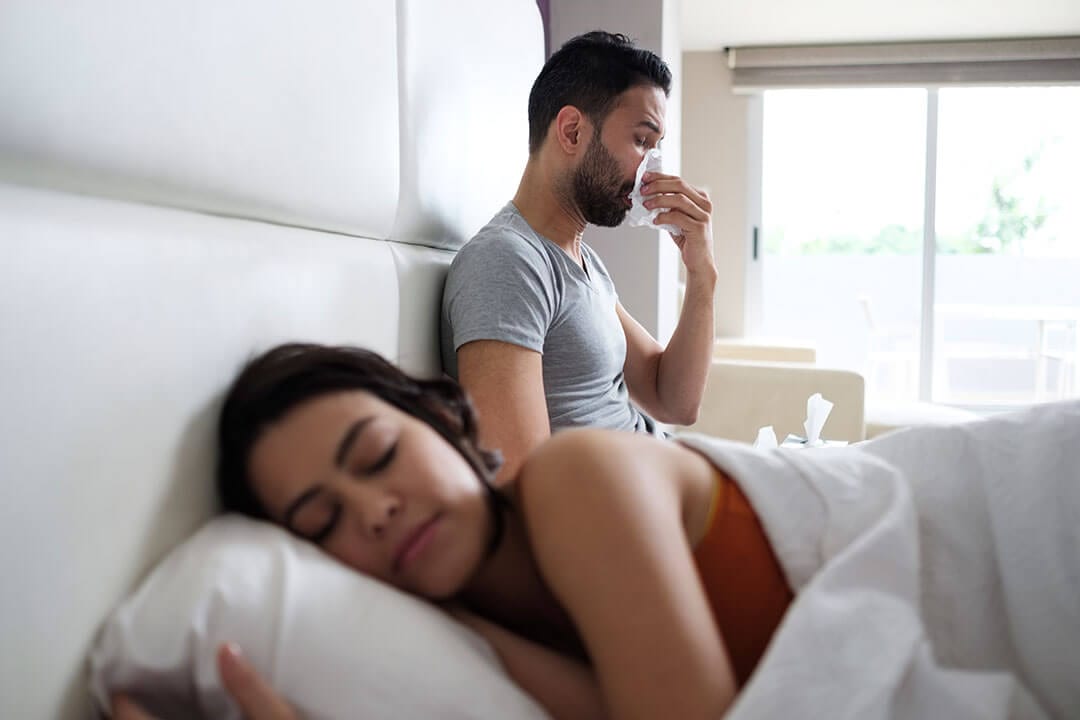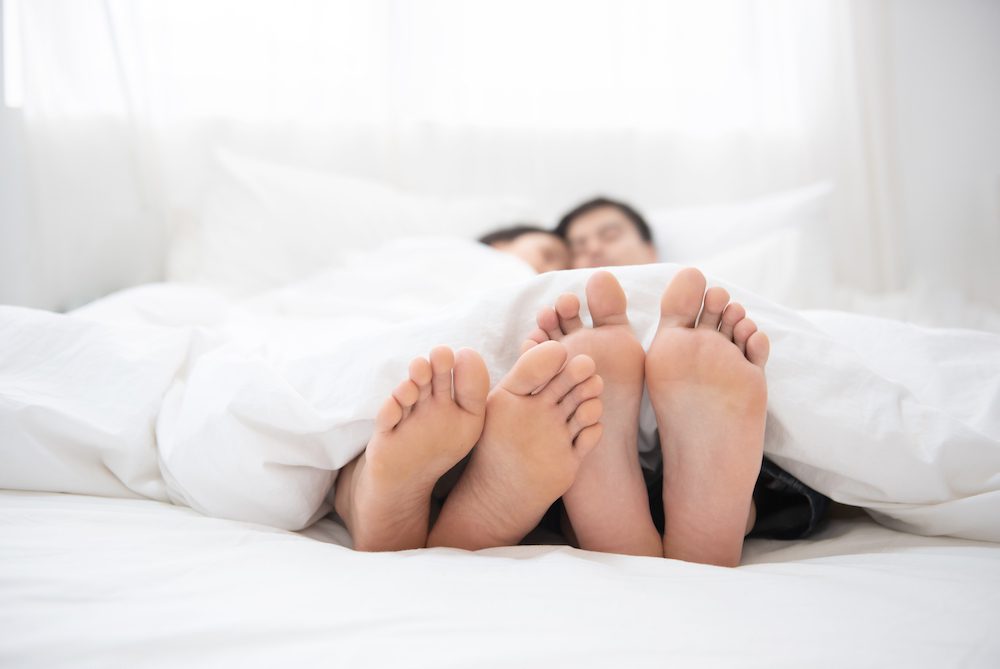Lower back pain is the second-most common reason that Americans visit the doctor. Almost 85% of adults have lower back pain at least once in their lifetime. Waking up with lower back pain can happen for many reasons.
Fortunately, lower back pain is often treatable and can sometimes even be prevented. We look at what causes lower back pain in the morning, how to feel better, and under what circumstances it might be best to talk to a doctor.
Why Do You Wake Up With Lower Back Pain?
People wake up with lower back pain for a number of different reasons. Certain sleep positions, a person’s mattress, and injuries are factors that can cause morning backaches. In many cases, however, lower back pain has no identifiable cause.
Sleep Position
Some sleep positions can trigger lower back pain and stiffness, whereas other positions may prevent such discomfort. Sleeping face down can place greater pressure on the spine, which can then lead to lower back pain in the morning. Some people also experience lower back pain after sleeping on their back.
Pressure on the spine can make it more difficult for the back muscles to repair and restore themselves during sleep. This pressure can also damage the ligaments and the discs that cushion the vertebrae, potentially leading to inflammation and more pain.
In contrast, side sleeping may prevent or alleviate sleep-related backaches. But evidence linking sleep positions with back pain is limited. More research is needed to determine, more definitively, which sleep positions are best for reducing lower back pain.
Mattress Type
The kind of mattress you sleep on can also affect whether or not you experience lower back pain in the morning. The best mattress for preventing lower back pain depends on your body type and what position you tend to sleep in.
A good mattress for preventing and alleviating a backache is firm enough to keep the spine aligned while offering enough contouring to cushion the pressure points where your body’s weight is most strongly positioned. The lower back is the primary pressure point for stomach and back sleepers.
A mattress that is too hard or too soft could place additional stress on the lower back or provide too little support, pulling the spine out of alignment. Both extremes could potentially lead to a morning backache.
Medium or medium-firm mattresses may be the best option to prevent pain, providing just the right amount of support for most people to maintain comfortable spine alignment without putting additional pressure in the wrong spots. People with a larger or smaller build, however, may need more or less support to stay comfortable.
The condition of the mattress can also have an effect on pain. An older mattress that sags in some places may not offer the support it did when it was newer and may induce back pain.
Injury to the Back
Lower back pain can result from gradual wear and tear to the bones, muscles, or ligaments that comprise the spine. The back can also experience sudden injury as a result of things like moving too quickly, lifting heavy objects, sitting for extended periods, or direct trauma to the area.
- Strained back muscles: Sudden injury or overuse can cause tearing or stretching of muscles in the back. This in turn can lead to localized pain, muscle spasms, or inflammation that causes stiffness.
- Broken vertebrae: Broken vertebrae cause sharp and severe lower back pain that can appear suddenly. They almost always result from direct trauma to the spine, such as a fall. Older people with osteoporosis are more likely to develop such fractures. Treatment includes rest, medication, physical therapy, and, sometimes, surgery.
- Ruptured or slipped disc: Vertebrae are separated by discs, made of cartilage, which cushion the spine and allow it to stretch and move. A slipped or ruptured disc in the lower back can impinge on nearby nerves causing sharp pain, numbness, or muscle weakness. Treatment can include pain medication, physical therapy, and surgery.
- Spinal stenosis: This narrowing of the space inside the spine can put pressure on the nerves of the spinal cord and cause significant back pain. This condition can be caused by bone diseases, tumors, a herniated or bulging disc, arthritis in the spine, or, in very rare cases, tumors.

Pregnancy
More than 60% of pregnant people experience some lower back pain, especially in the latter half of a pregnancy. Several physical changes can contribute to pregnancy-related back pain, including weight gain, hormonal fluctuations, and a shifting center of gravity. Although the pain may get worse further into the pregnancy, it usually dissipates after giving birth.
Pregnant people may prevent morning back pain by sleeping on their side with their knees bent. Also, placing a pillow between the knees or under the stomach can help to relieve pressure on the spine. If the bed is too soft to provide enough support while pregnant, placing a wooden board between the mattress and box spring could provide a temporary fix.
Small lifestyle changes that people who are pregnant can make during the day to help reduce back pain include:
- Wearing shoes with strong arch support
- Avoiding lifting heavy items
- Using a chair with good back support or adding a pillow for support
- Applying a hot compress to the back
- Taking breaks during longer periods of sitting or standing
Tips to Relieve Morning Lower Back Pain
If you wake up with lower back pain, there are a few treatments you can try at home. In many cases, lower back pain can improve with some basic at-home care and attention and often within a few weeks.
- Change your sleep position: Try sleeping on your side, in the fetal position, with your knees bent toward your chest. Placing a pillow or towel between your legs can also help. If you sleep on your back, try relieving spinal pressure by putting a pillow or blanket under your knees.
- Use a hot compress: Consider applying heat to your lower back if it is painful. There is some evidence that It may help with muscle spasms, though it can be helpful to see a doctor if the pain persists.
- Be gentle on your back: Reduce your activity level for a day or two after the onset of pain. In the first few weeks, stay as active as possible without causing more injury. Light aerobic exercise can help to bring blood to the back area and help it to heal. Go easy with stretching and strength training, and avoid lifting heavy objects for six weeks.
- Take an over-the-counter pain reliever: Ibuprofen and acetaminophen may help you to feel better. Acetaminophen can help to reduce aches and pains, as can ibuprofen. Ibuprofen also helps to reduce inflammation.
How to Prevent Morning Lower Back Pain
There are many steps you can take to prevent lower back pain from occurring.
- Get regular exercise: Strength training, stretching, and regular movement can help to make your back both stronger and more flexible. Regular exercise may also help you to sleep better, as long as you avoid vigorous exercise close to bedtime.
- Lift the right way: When lifting a heavy object, bend at your knees instead of at your waist. Put your weight on your leg muscles, and avoid twisting or bending forward when you stand back up. Alternatively, ask for help if you are attempting to lift something heavy or cumbersome.
- Keep moving: Avoid standing still for long periods of time. If standing is unavoidable, periodically rest each foot on a stool, if available. If you must drive or sit for extended periods, use a pillow to support your lower back, and get up and walk around at least once an hour, if possible.
- Wear more comfortable shoes: Opt for cushioned walking shoes whenever possible, and avoid wearing high heels when you can.
- Change your mattress: Your mattress may not offer enough support to keep your spine aligned, or enough contouring to relieve pressure. If your mattress is over 10 years old, it may sag and not offer proper support. If buying a new mattress isn’t feasible, add a new topper to it to extend its life.
If you have tried treating your backache on your own but have not felt enough improvement, it may be time to see your doctor.
When to See a Doctor
Lower back pain often improves on its own after several weeks. Consider talking to your health care provider if you continue waking up with low back pain after four weeks.
Your doctor may recommend treating your discomfort with pain medication, exercise, or physical therapy. Or they may take a medical history or perform a physical exam to determine whether a more serious medical concern might be at the root of your back pain.
On rare occasions, lower back pain can be the sign of something more serious. Make an appointment with your doctor if you have frequent or severe morning backaches and you:
- Having difficulty falling asleep or are waking up at night due to pain
- Are losing weight without trying
- Have recently fallen or injured your back
- Feel pain when you urinate or see blood in your urine
- Cannot control your bowels or bladder
- Have previously had cancer
- Are weak or numb in the lower half of your body
References
Ask the Sleep Doctor
Have questions about sleep? Submit them here! We use your questions to help us decide topics for articles, videos, and newsletters. We try to answer as many questions as possible. You can also send us an email. Please note, we cannot provide specific medical advice, and always recommend you contact your doctor for any medical matters.






